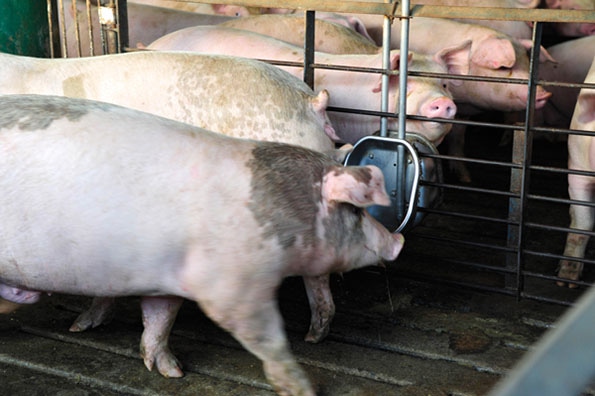USDA moves forward on GIPSA rules
USDA is moving ahead with GIPSA rules, minus a number of 2010 proposed provisions; trading rules with Cuba eased; grants available to ease rural veterinary shortages.

USDA is moving forward on the “Farmers Fair Practices Rules” regarding contracting practices for livestock and poultry. The department has sent to the White House Office of Management and Budget an interim final rule on competitive injury.
This would eliminate the need for producers to provide proof of competitive injury to the entire industry in order to file a complaint. This overturns eight federal court rulings. There are also two proposed rules to address unfair practices and undue preference in violation of the Packers and Stockyards Act and poultry grower ranking systems.
Secretary of Agriculture Tom Vilsack said the USDA is leaving out a number of provisions that were proposed in the Grain Inspection, Packers & Stockyards Administration rule of 2010. These include proposals that would have prevented meatpackers from buying livestock from other packers, banned packers from entering into exclusive agreements with certain livestock dealers, and required packers and live poultry dealers to submit sample contracts to USDA for public review.
The reaction from producers and industry was immediate. The North American Meat Institute says, “It is irresponsible for USDA to advance this stale six-year-old rulemaking. The interim final rule as described will open a floodgate of litigation, up-end the established system for marketing cattle, pork, and poultry in the United States, and add costs at every step along the process from producers to consumers.”
Sen. Pat Roberts (R-KS), chairman of the Senate Agriculture Committee, says, “While the impact of these rules is not fully known, if they are in any way similar to the 2010 GIPSA proposal, I have serious concerns that the U.S. livestock, poultry and meat sectors will be tremendously burdened and experience irreparable harm during already difficult economic times.” However, the National Farmers Union, a strong proponent of the rules, says, “Livestock producers and poultry growers have been waiting too long for much-needed protections against the fraudulent, anti-competitive practices they fall victim to in the marketplace.”
In 2010 when the first GIPSA rules were proposed, they met strong opposition from producers, industry and Congress because of the lack of significant economic analysis and they went beyond the intent of Congress as authorized in the 2008 farm bill. An Informa Economics study found that the 2010 proposed rules would have cost the pork industry $330 million annually.
Administration eases Cuba trading
As Congress refuses to consider lifting the Cuba embargo, President Obama continues his efforts to open relations between the two countries.
The administration announced a number of new rules regarding trade. Americans traveling to Cuba may return with cigars and rum for their personal use under new regulations put forward by the Obama administration. The new rules will also make it easier to export farm equipment to Cuba.
Also, the U.S. poultry industry should benefit from the lifting transportation restriction on ships delivering products to Cuba. Currently ships that deliver products to Cuba cannot return to the United States for 180 days. The new rules eliminate this 180-day restriction.
USDA makes grants to relieve veterinary shortages
USDA is making $2.3 million available in 10 states to help relieve shortages of veterinary services through education, extension, training and support for new and existing veterinary practices in designated rural shortage areas.
USDA says, “The new Veterinary Services Grant Program will enable training and retention initiatives to support veterinarians and veterinary technicians so they can continue to provide quality services in rural areas. It also supports the expansion of existing veterinary educational programs and facilities, including mobile services.”
According to USDA’s National Institute of Food and Agriculture, “VSGP grants fund work by universities, veterinary associations, and state, local or tribal agencies to help relieve veterinary workforce shortages in the U.S. food and agriculture sector. Funds may also be used to support the establishment or expansion of veterinary services in eligible rural areas.” Fiscal year 2016 grants include:
♦ American Association of Bovine Practitioners, Opelika, Ala., $224,136
♦ Colorado State University, Fort Collins, Colo., $238,251
♦ University of Georgia, Athens, Ga., $236,243
♦ Kansas State University, Manhattan, Kan., $239,656
♦ University of Minnesota, St. Paul, Minn., $238,346
♦ Betsy the Vet Inc., Hardin, Mont., $124,462
♦ Lewistown Veterinary Service, Lewistown, Mont., $116,036
♦ Town and Country Veterinary Clinic, Auburn, Neb., $124,760
♦ Utah State University, Logan, Utah, $236,619
♦ University of Wisconsin, Madison, Wis., $237,32
♦ Wisconsin Veterinary Medical Association, Madison, Wis., $238,429
♦ Squared Circle Veterinary, Evanston, Wyo., $104,000
USDA’s 2016 competitive grants are made available through the new VSGP that was authorized in the 2014 farm bill.
About the Author(s)
You May Also Like



